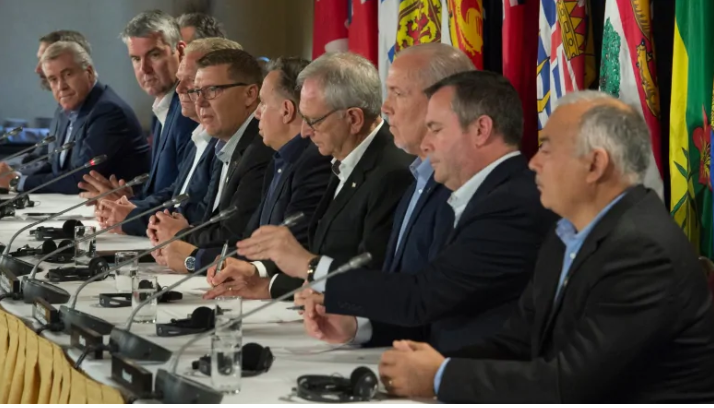
Between 50 and 60 per cent of Albertans support potential secession from the federation: Kenney.
Canada’s premiers say national unity is strong across the country and that regional leaders are working together on a number of fronts to ensure that harmony becomes even stronger.
The provincial and territorial premiers made the comments at the closing press conference of the two-day Council of the Federation meeting hosted by Saskatchewan Premier Scott Moe in Saskatoon.
The two outliers among the provincial leaders were the premiers of Saskatchewan and Alberta, who maintained that frustration over political factors hampering oil development and export have increased alienation in their provinces.
“This is not just some random political opinion,” Alberta Premier Jason Kenney said. “We had at least two credible pollsters in the past three months indicate between 50 and 60 per cent support for the principle of a potential secession from the federation.
“I don’t think Albertans are actually ready to do that, I think they believe in this country, but that’s a way that they are expressing a truly profound sense of alienation. And all they ask for is fairness within the federation.”
Kenney said that while there is no private sector proposal to build a pipeline to transport oil from west to east, such a plan could win investment if the federal government offered some certainty that it would be approved.
Moe and Kenney have warned of western alienation before — most recently in response to the passage of federal legislation banning oil tanker traffic off the coast of British Columbia and a new environmental assessment law that changes the the approval process for natural resource projects.
They said that both laws frustrate the oil and gas industry and make it harder for Saskatchewan and Alberta to overcome the economic challenges facing Canada’s energy sector.
Kenney aimed his criticisms directly at the federal government and Quebec, accusing Prime Minister Justin Trudeau of giving Quebec a virtual veto over a west-east pipeline.
“Albertans ask the reasonable question: if [Quebec is] not willing to accept our resources, why are [they] willing to accept the money that comes from them?” he said.
Agreeing to disagree
Quebec Premier François Legault maintains that there is no “social acceptability” in his province for a pipeline connecting Alberta to refineries in New Brunswick and crossing through his province, and that he will continue to oppose any such proposals.
Another point of division between Quebec and at least one other province was the Legault government’s controversial new law banning the wearing of religious symbols by certain public employees.
Manitoba Premier Brian Pallister has attacked the law publicly as a “dangerous” and “un-Canadian” attack on personal freedoms. He said today that while he respects Legault for following through on a campaign promise to pass such a bill, he disagrees with the law itself.
“I think he’s a fine man … and if two men always agree, then one of them isn’t doing any thinking,” Pallister said.
“The people of Manitoba celebrate our diversity. I believe our country does too. I don’t think we should hide that. My position will continue to be what it is, and perhaps the premier’s will continue to be what it is as well.”
Other premiers said that while there were disagreements on pipelines and the religious symbols law, the provinces are working together on trade, labour mobility, immigration, climate change, health care and treatment for addictions.
“I don’t believe the country’s divided, nor do I believe we’re in a situation as was described,” said Nova Scotia Premier Stephen McNeil. “If you look around this table and the conversations that have happened today, it actually has been about cooperation.”
McNeil said there should have been pipelines across the country decades ago but the premiers are continuing to work on things they can fix now.
The premiers agreed to review the exemptions they put into the interprovincial Canadian Free Trade Agreement — which took effect July 1, 2017 — with a view to removing as many as possible. Kenney announced Wednesday that his province would eliminate half of its exemptions and would work to remove the rest.
Letters to federal party leaders
They also presented a united face on a number of requests they’re making of the federal government.
On health care, they want the federal government to increase the annual health transfer to the provinces by 5.2 per cent per year. Transfers currently rise by either 3 per cent per year, or by the three-year average of nominal GDP growth, whichever is higher.
The premiers also said that they asked the federal government to work with them on the proposed federal pharmacare plan to ensure that federal funding for drugs does not hamper work the provinces are already doing.
The leaders also want the federal government to streamline their access to funding to mitigate natural disasters — funding which they said is not timely or flexible enough to cope with sudden weather events driven by climate change.
On Wednesday, the premiers asked the federal government to work with them to standardize professional certifications across the country, streamline immigration rules to ensure Canada gets the skilled workers it needs and press the United States for an exemption from “Buy American” legislation that they said disproportionately hurts Canadian workers.
In a somewhat unusual move, the premiers released copies of letters they sent to the federal party leaders asking them to outline their policies on job and skills training, immigration, healthcare, climate change, Arctic sovereignty, reconciliation with Indigenous Peoples and their commitment to federalism.
Moe said that the responses to the premiers’ letters will be released publicly to help inform voters in advance of the coming federal election.
Next year’s Council of the Federation meeting will be hosted by Quebec from July 22 to 24.


